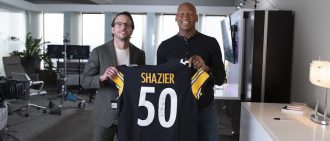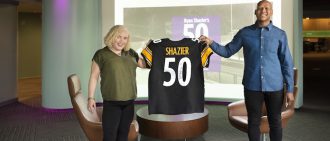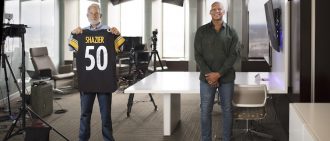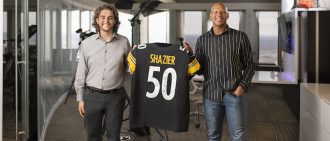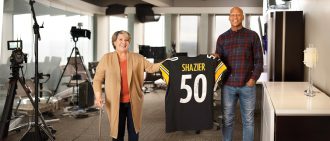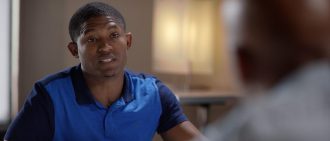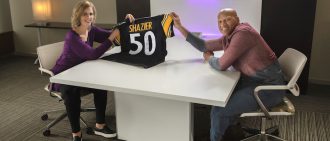Kristin Fox thought she was dealing with a normal case of the flu.
It turned into a battle for her life.
Complications from influenza A left the Poland, Ohio, mother of two and assistant high school principal near death.
“I was listed as imminent death,” Kristin says. “My family was all there basically preparing for when. Not if she’s going to die, but when.”
But she didn’t die.
Complications eventually would force doctors to amputate both of Kristin’s legs below the knee and both arms below the elbow. But she was determined to survive — and to come back strong.
Two months after her injury, Kristin came to Pittsburgh for rehabilitation at UPMC Mercy and began the process of rebuilding her strength. And less than a year from that near-death experience, Kristin is full of life.
“I’m a determined person,” she says. “I have an amazing support team behind me. I’m just fighting through it and going day by day.”
Ryan Shazier's 50 Phenoms Season 2
‘The Worst Thing I’ve Ever Felt in My Life’
It was early March 2020 when Kristin began to feel sick. Her local doctor in Poland — a suburb of Youngstown — diagnosed Kristin with influenza A and prescribed medicine..
Instead of getting better, Kristin began to feel worse. By the next day, she was seriously ill.
“It was the worst thing I’ve ever felt in my life,'” she says. “I called one of my friends who’s a nurse, and she said, ‘You need to get to the hospital now.'”
At the hospital in nearby Youngstown, her condition continued to get worse. Diagnosed with bacterial pneumonia in both lungs — a flu complication — doctors put her on a ventilator. She then developed sepsis, a life-threatening condition caused by her body’s reaction to the infection. When her fingers began to show signs of blood loss, doctors told her family to prepare for the possibility of limb loss — or death.
“By the grace of God and strength that I didn’t know I had, I pulled through,” Kristin says.
But the setbacks were just beginning. Kristin began to suffer from kidney failure and was put on dialysis. Eventually, the doctors would place her in a medically induced coma.
And the COVID-19 pandemic, which hit the United States full force early in Kristin’s hospital stay, meant she could have only a limited number of visitors.
“I don’t remember any of this, thank God,” Kristin says. “My mom and dad kept a journal every single day of everything — from my temperature, to what doctor I saw, everything. And it’s crazy to read everything that I went through medically.”
By late March, doctors knew they would need to amputate Kristin’s legs below the knee. In early April, they amputated both arms below the elbow.
Never Miss a Beat!
Subscribe for articles and more from Ryan Shazier’s 50 Phenoms.
Thank you for subscribing!
You can now select the specific newsletters you'd like to receive.
You are already subscribed.
Subscribe to more newsletters in our email preference center.
Sorry, an error occurred. Please try again later.
Get Healthy Tips Sent to Your Phone!
‘I Have to Get Back to Me’
As her condition stabilized and she emerged from the medically induced coma, Kristin began to learn about the surgeries that saved her life. Coming to grips with her situation, Kristin was determined to regain her strength and independence despite the amputations.
“I had to get back to me,” Kristin says. “I knew in my heart that I was going to beat this.”
Kristin and her loved ones researched the best places to go for rehabilitation. She chose the UPMC Rehabilitation Institute at UPMC Mercy in Pittsburgh.
“I needed intense therapy at that point,” she says. “We decided UPMC was the best place to go.”
She was transferred to UPMC Mercy in May 2020. On her first day there she was able to see her young children for the first time since early March.
“My son was just sobbing,” Kristin recalls. “My daughter was like, ‘Mommy, we’ve got this,’ and she’s seven years old.” Seeing her children was exactly what Kristin needed. “You’re right. We’ve got this, sis,” she told her daughter. “I will do this.'”
‘The Biggest Motivation Ever for Me’
When Kristin began physical and occupational therapy in mid-May, she couldn’t sit up on her own. Soon she was doing that by herself, rolling over on her own, and getting into her wheelchair on her own.
The early portion of Kristin’s therapy focused on adapting to her new prosthetic arms and hands. After the long hospitalization, she first had to build strength in her shoulders. But she also had to re-learn everyday tasks.
Because Kristin’s new hands were electronic, she had to learn how to use them.
“If you just think about it, you do about a million things with your hands every single day,” says Phebe Lockyer, OTR/L, Kristin’s occupational therapist. “How you feed yourself, how you get dressed — all of these tasks of everyday life. That was just eliminated from her, and we had to figure out other ways to get around it.”
Because of COVID-19 restrictions, Kristin’s entire family remained in Ohio during her stay at UPMC Mercy. But her therapists — and the desire to get back to her family — kept her going.
Along the way, they celebrated every milestone, big or small.
“I had two of the best physical and occupational therapists at Mercy. Even when I was tired, they never let me say no,” Kristin says. “They pushed me. And being pushed by them was the biggest motivation for me because they believed in me, and they knew that I could do it.”
In late June 2020, after six weeks at UPMC Mercy, Kristin returned home to continue her therapy. But the next month, she suffered another medical complication: a collapsed lung. Despite the distance from their home near Youngstown, her husband drove her to the UPMC Mercy Emergency Department. “It was the best care,” Kristin says.
After recovering from that setback, Kristine resumed therapy at UPMC Mercy and began working with her prosthetic legs in September. After three weeks of gait training — including learning to walk with the assistance of a platform walker — Kristin was able to return home again.
“You grow really close with your patients,” Phebe says, “And to see them hit these goals, especially knowing all they’ve been through, there’s no better feeling.”
‘Giving Up Is Not an Option’
Kristin isn’t fully back to 100%. She has some trouble with certain daily tasks, like brushing her hair. Her walking still isn’t where she wants it to be.
But it’s a massive improvement from where she was in March 2020. And she’s determined to keep going. Before an annual camping trip to Seven Springs with friends, she told them she would walk through the door of the cabin.
“I walked in,” she says. “We all cried.”
Crying was something Kristin avoided during her ordeal; she has tried to stay positive, even in the darkest moments.
“Giving up is not an option for me,” she says. “I have to get through this. I cannot change the outcome. I’m not going to get my arms back. I’m not going to get my legs back. My biggest thing is that I want to get back to me.”
One thing that Kristin is thankful for is the support she received — from her family and her community.
Over the last year, she’s even heard from students she taught several years ago. Community-sponsored spaghetti dinners and T-shirt sales helped to raise thousands of dollars for her treatment. A Facebook group created in her honor has more than 2,000 followers.
“I will always be proud to say I’m from Youngstown,” she says. “There’s heart here like no other.”
Kristin continues with therapy as she strives to regain full strength. She has returned to her job as a high school administrator but works remotely because of the COVID-19 pandemic.
“Kristin has continued to increase her independence using four prosthetic limbs and is planning on returning to work within the next month,” says Maria Twichell, MD, medical director, General Rehabilitation, UPMC Mercy, and assistant director, UPMC Rehabilitation Network. “The fact that she has come this far, this fast, is a testament to her perseverance, positivity, and resiliency.”
Kristin hopes to write a book and become a public speaker to advocate for people with disabilities. She believes her message and her story can resonate with others.
“Never have a bad day,” she says. “Let it be a bad moment, but don’t let it be a bad day. I have bad moments, for sure, but I don’t ever have a bad day. Never let yourself believe that you can’t beat something.”
About UPMC Rehabilitation Institute
The UPMC Rehabilitation Institute offers inpatient, outpatient, and transitional rehabilitation, as well as outpatient physician services so that care is available to meet the needs of our patients at each phase of the recovery process. Renowned physiatrists from the University of Pittsburgh Department of Physical Medicine and Rehabilitation, as well as highly trained physical, occupational, and speech therapists, provide individualized care in 12 inpatient units within acute care hospitals and over 80 outpatient locations close to home and work.
